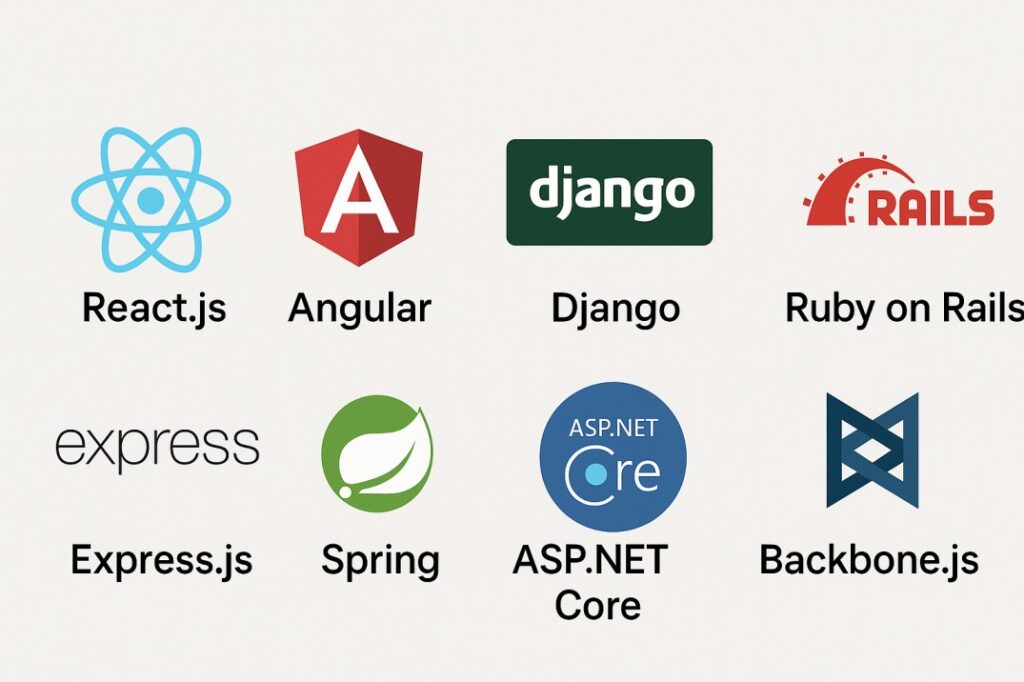Web development has become a backbone for modern businesses. Choosing the right framework can define your project’s success. Frameworks simplify development, reduce costs, and improve performance. To help you make informed decisions, here are the top 10 most-used web development frameworks you can rely on.

1. React.js- The Leading Front-End Library
React.js is one of the most popular frameworks for building interactive user interfaces. Developed by Facebook, it offers component-based architecture that makes development faster. Its virtual DOM boosts performance, while reusable components ensure scalability. Businesses use React.js for dynamic, high-performing web applications.
2. Angular- A Complete Front-End Framework
Angular, developed by Google, provides a robust solution for building single-page applications. It uses TypeScript, offering strong typing and clear structure. Angular’s two-way data binding improves real-time updates. Large enterprises trust Angular for building scalable and enterprise-grade applications.
3. Vue.js- Lightweight and Flexible
Vue.js is a progressive JavaScript framework known for simplicity. It integrates easily with projects and existing libraries. Vue’s flexibility allows developers to build small apps or full-scale applications. Its learning curve is gentle, making it a favorite among startups and mid-sized businesses.
4. Django- The Python Powerhouse
Django is a high-level Python framework that emphasizes speed and security. It includes built-in features such as authentication, admin panels, and form handling. Developers love Django for its “batteries-included” philosophy. Many businesses choose it for robust and secure web applications.
5. Ruby on Rails- Rapid Development Framework
Ruby on Rails is famous for speeding up development cycles. It follows convention over configuration, reducing repetitive coding tasks. Rails includes ready-to-use modules that save time. Startups often adopt Rails for MVPs and quick launches, without compromising on quality.
6. Laravel- PHP Made Elegant
Laravel is a PHP framework with a clean syntax and powerful tools. It provides features like routing, authentication, and session management out of the box. Its Blade templating engine makes building views seamless. Laravel is perfect for businesses needing flexible and secure web apps.
7. Express.js- Fast and Minimalist
Express.js is a minimal Node.js framework designed for speed and flexibility. It simplifies server-side development with a straightforward approach. Its unopinionated nature allows developers to use different tools as needed. Express.js powers many APIs and scalable applications across industries.
8. Spring- Enterprise-Grade Java Framework
Spring is a leading framework for Java-based web applications. It supports modularity, dependency injection, and robust security features. Spring Boot simplifies configuration and deployment. Large enterprises prefer Spring for mission-critical applications requiring stability and scalability.
9. ASP.NET Core- Microsoft’s Versatile Framework
ASP.NET Core is a cross-platform framework created by Microsoft. It supports cloud-based and enterprise-level applications. Its performance is fast, and it integrates seamlessly with Azure services. Businesses rely on ASP.NET Core for modern web apps and scalable enterprise solutions.
10. Backbone.js- Lightweight and Structured
Backbone.js provides structure to JavaScript-heavy applications. It uses models, collections, and views to organize code. Despite being lightweight, it supports building complex applications. Many developers still use Backbone.js for projects requiring simplicity and maintainability.
How to Choose the Right Framework
Selecting the best framework depends on your project needs. Consider factors such as scalability, security, performance, and developer expertise. A lightweight framework may be ideal for startups, while enterprises may need advanced options. Cost and community support also influence long-term success.
Why Frameworks Matter in Modern Development
Frameworks accelerate development by providing reusable components. They enhance security through built-in features and reduce maintenance costs. Additionally, frameworks improve team collaboration by following standard coding practices. For businesses, frameworks offer efficiency and scalability from the start.
Conclusion
Web development frameworks play a critical role in building modern applications. From React.js to ASP.NET Core, each framework has unique strengths. The right choice can enhance performance, reduce costs, and ensure scalability. At SiGa Systems, we specialize in delivering tailored web solutions using industry-leading frameworks. Whether you need web design, development, or custom web applications, our team is ready to bring your vision to life.


